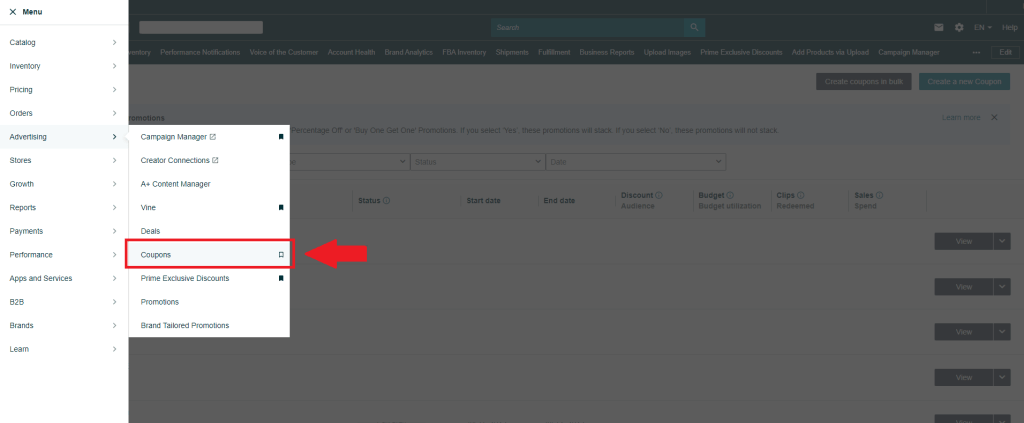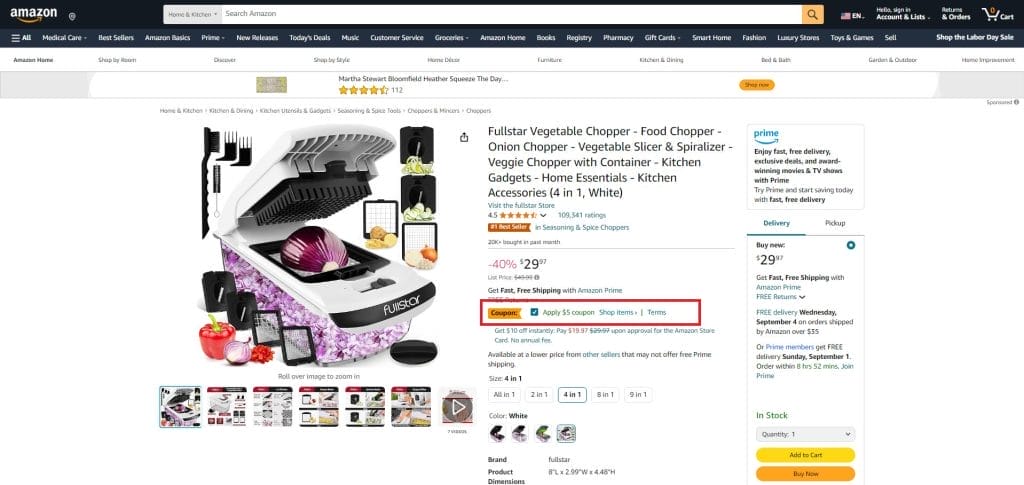Amazon Coupons—A Guide For Sellers


Customers love to save money. From Black Friday to Amazon Prime Day, people will regularly go out of their way to find great deals to save a few bucks, which is why promotional material and special offers mean so much to shoppers, especially on Amazon. Coupons have been traced back to the late 1800s when Coca-Cola offered a free sample of their year-old drink, priced then at five cents, through hand-written tickets. Over the years, as consumer behavior shifted towards ecommerce, coupons have evolved from physical paper slips to digital codes and online discounts. Amazon made sure to adopt the practice for sellers to attract new and existing customers to boost sales.
Amazon coupons are a versatile promotional feature designed to help sellers attract more customers and boost their sales. They offer a simple and effective way to provide discounts directly on product listings, allowing shoppers to easily “clip” the digital coupon and apply the savings during checkout. Amazon coupons are highly visible, which makes them an attractive option for sellers.
They’re visible across multiple sections of the site, increasing the likelihood of catching the attention of your target audience. Not only does the use of coupons enhance your product visibility, but it also helps drive higher conversion rates that make it an essential and effective strategy for those looking to stand out amongst their competition. Coupons from top-selling Amazon sellers appear on Amazon’s coupons page, where people can save the discounts most relevant to them.

Keeping cost in mind when building a coupon strategy is crucial for maintaining profitability and returning a positive ROI. The costs associated with the discounts and redemption fees can quickly add up and chip away at your profit margins. By carefully planning and budgeting for these costs, your coupon strategy can still support your financial goals.
When looking at the cost of using Amazon coupons, it involves two components: the discount offered to customers and the redemption fee charged by Amazon. In the US, the standard redemption fee is $0.60 per coupon redeemed. This means your total cost includes $0.60 on top of the actual discount amount given to the customer.
For example, if you offer a $5 discount that 200 customers redeem, you will pay $120 in redemption fees in addition to the $1,000 in discounts given to the customers.
Amazon coupons provide a powerful way to enhance your products visibility. When you use coupons, you’re essentially paying for ad space for your products because it increases the chances of consumers buying your product. By offering a discount through coupons, you can incentivize potential customers to choose your product over others as they weigh their options. With coupons predominantly displayed on product pages and in Amazon’s dedicated coupon section, you’re giving your products extra exposure that can lead to more clicks. More redeemed coupons equal more sales, and with more sales, it can help provide the necessary boost to climb organic rankings.
So, whether you’re looking to boost sales for a new product or increase brand awareness, Amazon coupons can be a strategic add to your existing marketing strategy.
Enabling Amazon Coupons for your products is a straightforward process that can be done directly from your Amazon Seller Central account. To get started, follow these steps:

After submission, the coupon will be reviewed by Amazon and once approved, it will go live on your specific date. You can monitor the performance within Seller Central, making any adjustments as needed to optimize performance and realign with your goals.

To maximize your ROI, it’s important to remember not to set your coupons live and never revisit them while they’re active. It’s essential to experiment with the different types of discounts, percentage off vs. dollar amount off, to see which resonates best with your customer base. Dollar amount off coupons are more straightforward and appealing, giving the shopper the exact amount off without requiring any calculation. Percentage off coupons can be enticing, particularly on higher priced items where the percentage can equal a significant savings.
A/b tests and continual refinement of your coupon strategy will help you identify which format drives the most engagement. By fine tuning your approach and staying aligned to your financial targets, you can optimize your coupon strategy over time and achieve the best possible ROI. For more tips on enhancing your Amazon sales strategy, subscribe to our blog or reach out to the team with questions.
Learn more about how we can help your Amazon business succeed!